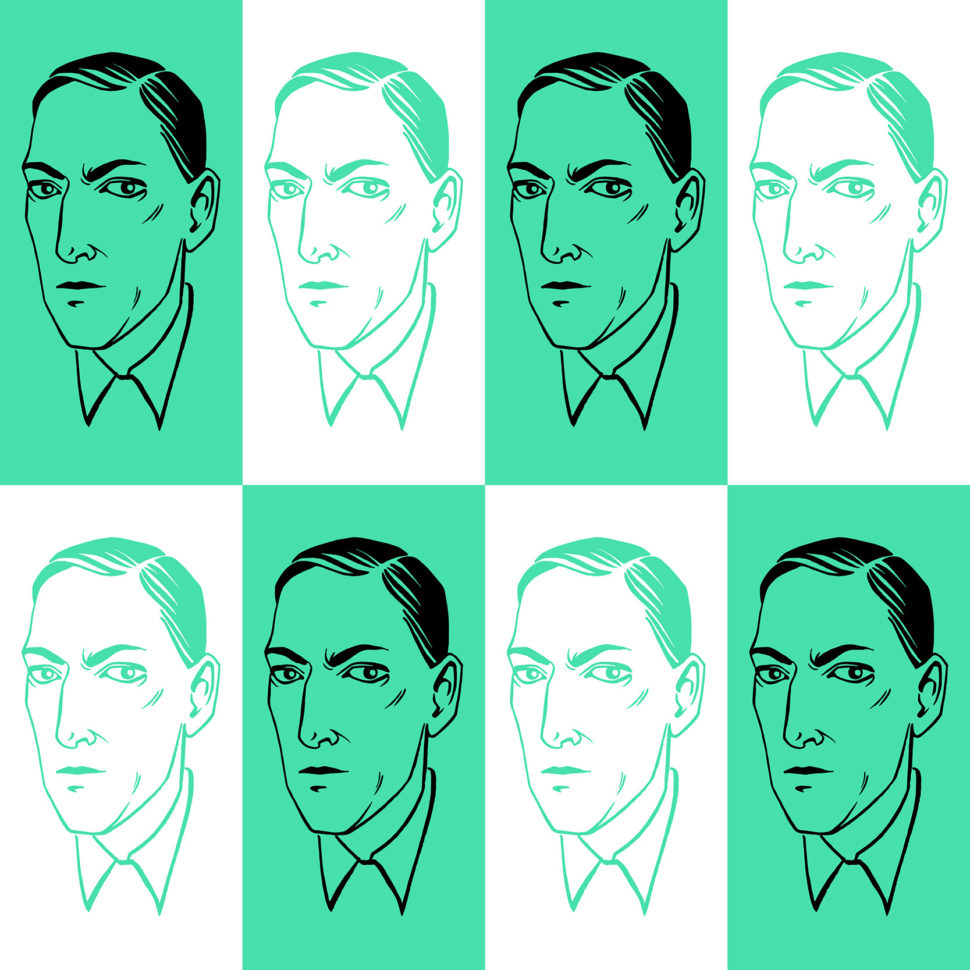Today is the birthday of one of the most important fiction writers of all time, H.P Lovecraft. Here, we take a look at the effect and influence his life and works have had on pop culture.
You might be familiar with the character Cthulhu or maybe something called the “Necronomicon.” Nope — that isn’t just a part of the film Army of Darkness.
In fact, there is a whole mythos beyond the tentacle monster known as Cthulhu.
Many modern authors draw inspiration from the works of H.P. Lovecraft. His short stories, published in magazines, feature elements of the ethereal, otherworldly, and, often times, terrifying or suspenseful.
I personally discovered him around age 12 by finding a very…animated book cover with a man being disemboweled amid a Dali-esque hellscape. While many of my other sci-fi author inspirations predicted real inventions, Lovecraft’s creations remain fiction for now.
So what is the story behind the author and how did he come to inspire generations?
Posthumous Recognition for his Pulp Horror Fiction
Howard Phillips Lovecraft came into this world on August 20th, 1890 in Providence, Rhode Island. Throughout his life, he utilized several pen names including Lewis Theobald, Edward Softly, and Humphrey Littlewit.
He spent most of his life in Providence, drawing inspiration from the Northeastern U.S. locale for many of his stories. He even created a fictional university known as Miskatonic University set in a fictional town in Massachusetts.
Though his mother came from money, his father came upon troubling times. After a stint in a hospital for psychotic episodes, Lovecraft’s father died in 1898. Despite coming from wealth, Lovecraft never saw much critical success while he lived.
He did eventually marry and relocate to New York — Brooklyn specifically. Due to his wife’s work, he even spent some time in Cincinnati and Cleveland.
But Lovecraft had an issue with rejection. In fact, if a story he submitted got rejected even once, he struggled to attempt to sell that story ever again. He struggled in the latter part of his life, much like Nikola Tesla whom we recently profiled.
Ultimately, Lovecraft passed away after being diagnosed with cancer of the small intestine. Of course, in true Lovecraft fashion, he logged his symptoms and experiences in a journal until he finally passed.
Controversy and Historical Legacy
Despite being one of the foremost cosmic horror fiction writers in memory, Lovecraft’s works come with many, many strings.
Very clearly, as seen in many of Lovecraft’s own correspondences, the author harbored heavy racist, antisemitic, and bigoted sentiments. He even penned a poem comparing black people to “beasts” which is pretty damning evidence.
While writers — including writers of color — continue to struggle with this fact, many still acknowledge his indelible influence on horror fiction. Many writers, including myself, now see how Lovecraft’s racism influenced his writing.
In fact, in his seminal story “The Horror at Red Hook“, the narrator suggests that “Syrian and Spanish, Italian and negro ‘elements'” have adversely affected the area known as Red Hook. You can read a more in-depth dive into this story here.
There’s even a cheeky — if saddening — game to guess who said what super bigoted quote: Adolf Hitler or H.P. Lovecraft. The internet is a weird place y’all.
Despite his obvious and unabashed racism, Lovecraft remains a distinct and powerful influence on horror and science fiction writers today. It bridges all genres from literature to poetry to video games and media.
Inspiration for Many Modern Video Games
While there is a directly inspired Lovecraft game coming in October, many modern video games take cues from Lovecraft’s works such as:
- Bloodborne
- Amnesia franchise games
- The Dragonborn DLC for Elder Scrolls V: Skyrim
- Sunless Sea
- Dead Space franchise games
- Alan Wake
- The Vanishing of Ethan Carter
- System Shock 2
- Grim Dawn
You can find more information about these games and others here. Having personally played many of these, I can confirm the inspiration.
You see, some of the key Lovecraftian themes include eldritch horrors, an uncaring universe, and the environment as a massive character in the story. There are also almost always some kind of occult or mystical elements to a Lovecraft tale.
Many stories also include a singular white male protagonist.
He narrates the story in great detail, all the while spurring a creeping fear in the reader that starts with a tingle in your spine, escalates with the feeling of hot breath on the back of your neck, and ends with some kind of horrific realization much too late to do anything about the situation.
Unfortunately, many of the movie adaptations didn’t turn out quite so well.
The most popular has to be Re-Animator, inspired by Herbert West – Reanimator. In the Mouth of Madness featuring Sam Niell also gained popularity, but many adaptations fell by the wayside into the void.
With Strange Aeons, Even Death may Die
With heavy influences on so many popular artists, Lovecraft’s works will continue to be broken down and scrutinized not just to understand the words. As someone so beholden to his racist views, it’s difficult to find the line between fiction and reality for Lovecraft.
Many also assert that his mental illnesses and struggles with money influenced his views and, therefore, his writing. The very short story “The Evil Clergymen” exemplifies this concept the best to me.
In it, the protagonist (very often reflecting Lovecraft himself), encounters a man appearing as a priest of the Anglican church. The protagonist describes him as “concealedly evil” looking. Spoiler alert: at the end of the story, the protagonist now looks like that man.
Transformation is a heavy theme in most of Lovecraft’s work along with the alteration of the humanoid form or thought process. These themes might signal at personal issues Lovecraft himself was ill-equipped or unable to deal with.
Perhaps only The Elder Ones know the answer to that musing.

















Comments (0)
Most Recent